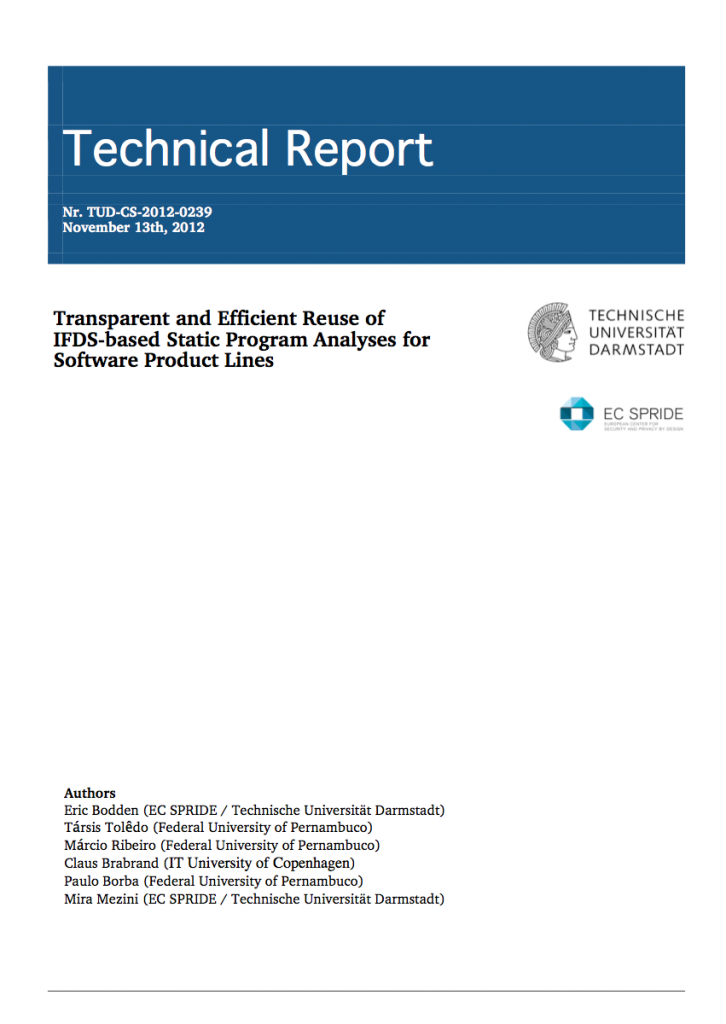 12th International Conference on Software Composition (SC 2013)
12th International Conference on Software Composition (SC 2013)
June 17–21 2013, Budapest, Hungary
http://sc2013.ec-spride.de/
The International Conference on Software Composition (SC) is the leading
venue that addresses challenges of how composition of software parts may
be used to build and maintain large software systems.
Software Composition 2013 will be the 12th edition in the series, and we invite researchers and practitioners to submit high-quality papers. Submissions that relate theory and practice of software composition are particularly welcome. Software Composition 2013 is co-located with the TOOLS 2013 Federated Conferences, taking place in Budapest between June 17th and 21st 2013.
Topics of Interest:
The SC 2013 program committee seeks original, high-quality papers related to software composition, including but not limited to the
following topics:
* Component-based software engineering
* Composition and adaptation techniques
* Composition algebras, calculi and type systems
* Feature-oriented software development
* Aspect-oriented software development
* Model-driven composition
* Models of computation
* Verification, validation and testing
* Dynamic composition and reconfiguration
* Large-scale component-based systems
* Cloud, service-oriented architectures
* Business process orchestration
* Visual composition environments
* Performance optimization of composite systems
We solicit high-quality submissions on research results and/or experience (up to 16 pages, LNCS format, including bibliography and
figures) describing a technical contribution in depth. Short and position papers are also welcome for the work in progress session (up to 8 pages, LNCS format, including bibliography and figures). Short submissions must concisely capture ongoing work, new ideas, and
experiences.
Submitted papers will be judged on the basis of significance, relevance, correctness, originality, and clarity. Submitted papers must be
unpublished and not submitted for publication elsewhere. As in previous years, the proceedings of the conference will be published as a volume in Springer’s Lecture Notes in Computer Science.
Conference Web Site:
http://sc2013.ec-spride.de/
Important Dates:
Abstract submission: January 20, 2013 (optional)
Paper submission: January 25, 2013 (23:59 anywhere on earth)
Acceptance notification: March 10, 2013
Camera-ready copy: March 22, 2013
General Chair:
Welf Löwe, Linnaeus University, Sweden
Program Chairs:
Walter Binder, University of Lugano, Switzerland
Eric Bodden, Technische Universität Darmstadt, Germany
Publicity Chair:
Stephen Kell, University of Lugano, Switzerland
Program Committee:
Danilo Ansaloni, University of Lugano, Switzerland
Sven Apel, University of Passau, Germany
Olivier Barais, University of Rennes 1, France
Alexandre Bergel, University of Chile, Chile
Domenico Bianculli, University of Luxembourg, Luxembourg
Daniele Bonetta, University of Lugano, Switzerland
Lubomír Bulej, Charles University, Czech Republic
Shigeru Chiba, University of Tokyo, Japan
Ion Constantinescu, Google, USA
Schahram Dustdar, Vienna University of Technology, Austria
Erik Ernst, University of Aarhus, Denmark
Bernd Freisleben, University of Marburg, Germany
Thomas Gschwind, IBM Zurich Research Lab, Switzerland
Michael Haupt, Oracle Labs, Germany
Christian Kästner, Carnegie Mellon University, USA
Doug Lea, State University of New York at Oswego, USA
Karl Lieberherr, Northeastern University, USA
David Lorenz, The Open University, Israel
Hidehiko Masuhara, University of Tokyo, Japan
Oscar Nierstrasz, University of Bern, Switzerland
Jacques Noyé, Ecole des Mines de Nantes, France
Ina Schaefer, Technische Universität Braunschweig, Germany
Andreas Sewe, Technische Universität Darmstadt, Germany
Mario Südholt, Ecole des Mines de Nantes, France
Clemens Szyperski, Microsoft Research, USA
Immanuel Trummer, EPFL, Switzerland
Alex Villazón, Universidad Privada Boliviana, Bolivia
Eric Wohlstadter, University of British Columbia, Canada
Thomas Würthinger, Oracle Labs, Austria
Cheng Zhang, Shanghai Jiao Tong University, China







